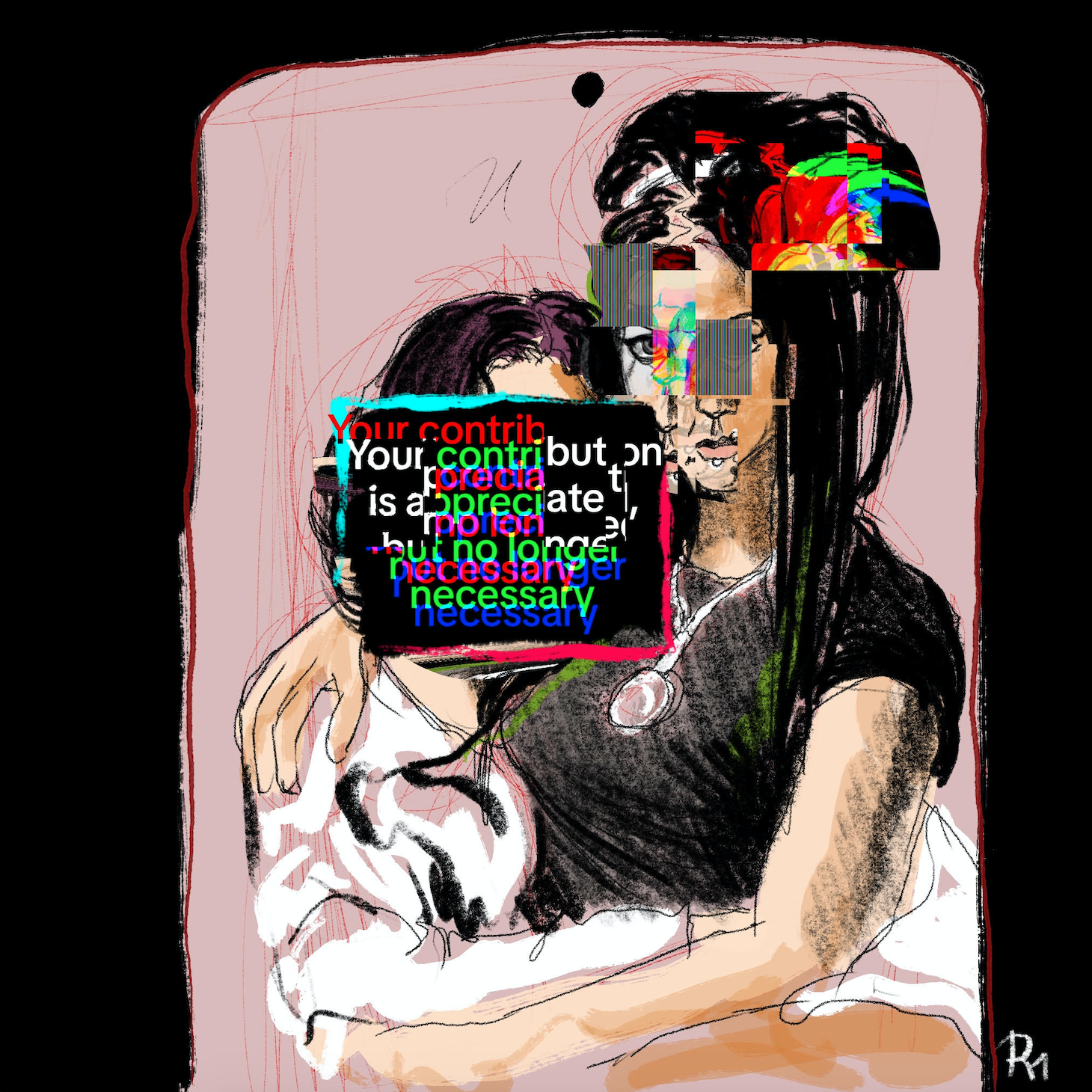Be Less Hard on Yourself for Crying Out Loud. It's Ridiculous.
I had one of those shower thoughts.
The best ones come to me when locked in a misty chamber of privacy and soap suds, concealed behind a cold curtain that gives me the ick when it sticks to the skin. Cor, that was a poetic start.
Perhaps thoughts worth investigating come to us when we are concerned only by shampoo scents and tap temperature, undisturbed by phones ringing, emails pinging, or humans asking us wishy-washy questions.
What was the shower thought?
‘How and when did we become our own worst critic?’
When did our internal monologue suddenly adopt a no-nonsense, authoritarian approach rivalling the Wormwoods? Why do we become self-flagellating adults who berate themselves for every little misstep?
I’m not entirely sure what led to this pitter-patter of pondering. Perhaps a particularly harsh round of internal insults pre-shower that had bubbled up and overflowed. A planned run that ended up somewhat stagnant and, well, in bed. A healthy week promise, ending in stuffed crust pizza and three glasses of wine.
Maybe it was that email sent with attachments unattached. Or, the Tesco incident where I’d stuttered twice more than I deemed acceptable during a conversation with a stranger who’d only asked if I needed a receipt.
It may have been prompted by the soap slipping out of my hand in the shower. And rather than blaming the slipperiness of the soap, I was to blame. Idiot.
Throwback to toddler tantrums
Remember when we used to scream, cry, and kick our feet? How about when we made the many mistakes that mini humans do: picked up something we shouldn’t have, picked our noses, pushed boundaries, pushed buttons, and pushed other little people over?
I’m not saying this was all acceptable behaviour. But we were never told why it wasn’t. We were just told No. No means no. No, no, no. Why? Because I said so. And it wasn’t only said once, oh no. It was always that quick-fire ‘‘nununununo’’, resounding the Guns ‘n’ Roses chorus. Welcome to the jungle, indeed.
Remember when we were told to pack it in, shut it up, sit still, get moving, stop crying, stop being such a child? Wind our necks in tighter than the jack in the box. If not, they’d be on the line. We were shushed and squashed and hushed and hurried. Maybe even a wallop or a shove to really get the point across.
This may be one reason we are so harsh on ourselves in adulthood. Our thought patterns replicate the words and treatment we received in childhood.
Evidence and experience show that how we behave, act, react, and think in adulthood is immensely determined by our childhoods. And it makes sense. These early lessons stick with us more than we’d like to admit, causing us to hold ourselves to the royally rigid standards as adults.
School’s out. Mems remain
Then came the school days when exams and public reprimands were the norm - those cringe-worthy moments of being called out in front of the whole class stick in our memories.
The shame of failing a test or being publicly scolded becomes a permanent fixture. These experiences get filed away in our mental archives, popping up at inconvenient times to remind us of perceived inadequacies.
We shared a full-time working week with other pre-pubescent humans who hadn’t mastered the knack for keeping unlawful opinions to themselves. They weren’t afraid to tell you if your ears were big, your coat was crap, or you were shit at goal defence.
Peers' opinions often felt like the ultimate judgement, as if their words could define our worth. And even though we might (and perhaps should!) laugh about it now, back then, every comment or criticism shaped the way we saw ourselves.
We were taught to follow the rules, to excel in subjects that didn’t always align with our strengths, and to conform to the expectations of others. I was awful at art yet squeezed into a subject I was no good at. We were forced to adhere to rules that may have been different from the ones at home, and this, along with the pressure to be good at everything, may have left many of us with an ingrained fear of making mistakes.
The school days added another layer to the critical inner voice many of us carry into adulthood. Speaking of which…
Adulthood
After anxiety-inducing-academia, we deep-dived Dolly Parton first into the adult world of 9 to 5, dodgy dating, untoward utility bills, and financial and emotional disarray. You know, then the pressures and expectations really ramp up.
Failed flings, job hops, tenancy endings - each event leaving a mark, and over time, adding up to a rather large, unwieldy pile of self-criticism. It’s like we’re carrying around an invisible rucksack filled with every mistake we’ve ever made, ready to pull out at a moment’s notice to chastise ourselves.
No longer fit into a size you once did? Heffer.
Turned off an exit early on a roundabout? Twat.
Missed your friend’s birthday because you already had a lot on that week? Shit friend.
Ordered a bit too much stuff from Amazon? Arse.
The chap that you liked ghosted you? Sounds like a you problem.
It’s all your fault. It’s all your fault. It’s all your fault.
We really do give ourselves a rough time, don’t we? So how can we soften up like the grey matter within which these thoughts occur?
Best friend yourself
Let’s begin with the above scenarios. If your best friend came to you and told you any of the above. How would you respond?
No longer fits a dress size: ‘‘‘You’re gorgeous and I think you look absolutely banging in those jeans.’’
Wrong roundabout exit: ‘’Don’t worry, I’m always doing the same. The sat nav’s just re-routed; take the next left.’’
Ordered too much stuff from Amazon: ‘’TREAT YOURSELF, YOU EARNED IT!!’’
Casper, the not-so-friendly ghosting: “Babe, his loss. Honestly, dating can be tricky these days. You’re worthy/attractive/funny/fun enough. It is a reflection on him, not you.”
Self-compassion is key. Treat yourself as a best friend or loving parent would. We know we can dish it out to the people we care about, offering grace and understanding without a second thought. So why not redirect some of that same compassion towards ourselves?
It’s not that we aren’t capable of kindness; we should just direct more of it inward. After all, we deserve the same love and encouragement we freely give others.
Challenge your inner critic with evidence.
It’s easy to get swept away by harsh self-judgement, but often, these thoughts aren’t grounded in reality. The next time your inner critic pipes up, take a moment to challenge it.
Is there actual evidence to support what I’m telling myself?
Am I really a “failure” because I forgot to send that one email?
Is this thought helping me or hurting me?
Chances are, the criticism is exaggerated. By asking yourself for evidence, you’ll find that much of what your inner voice says is unfounded. Reframe your thoughts with more balanced, fact-based reasoning and give yourself credit where it’s due.
Perfectionism/Schmerfectionism
Perfectionism often fuels our inner critic. It leads us into the very dangerous territory of thinking that mistakes are unacceptable. Mistakes are an absolutely inevitable and necessary part of learning and growth. No one is flawless, no matter how they appear online or in the media or how they show up at work or social events.
Think back to the last mistake you made. What did you learn? And is it a problem right now? In this moment?
When you accept imperfections as a normal and valuable part of life, your inner critic begins to lose its grip. Besides, it’s through these so-called failures that we gain insight and resilience. So, instead of berating yourself for the missteps, see them as stepping stones towards becoming a more authentic, understanding and accepting version of yourself.
Filter in some fun!
Sometimes, the thoughts we take so seriously are downright absurd when we stop to think about them. Also, what determines which thoughts we focus on? Why do we take the bad ones as gospel?
I’ll give an example. I’ve had Sisqo’s ‘Thong Song’ pop into my head since its release in 1999. I’ll let you do the maths, but that’s a long time for my mind to be revisiting the lyrics ‘dumps like a truck, truck, truck, thighs like what, what, what.’’ But I don’t take it seriously. It doesn’t make me question my heterosexuality or level of sanity to have a song in my head about women in ’90s lingerie.
Giving ourselves a rough time over small, inconsequential things like stumbling over a word or missing a turn on the roundabout? Imagine turning those thoughts into a bit of banter with yourself. When your inner critic berates you for taking the wrong exit, respond with a laugh and say, "Hey, at least I’m keeping things interesting!" By adding humour to the mix, you diffuse the intensity of the criticism. Not every thought deserves your full attention, and poking fun at the ridiculousness of some (as we do with certain thoughts) of them can lighten the load.
Investigate the self-hate
Slow down in these moments of though-ture! Where does this inner critic really come from? Sometimes, that harsh voice in our head isn’t even our own.
It may echo the words of someone from our past, such as a critical teacher, a strict parent, or an unresolved childhood memory. Investigating the source of these thoughts can be helpful, not to blame but to gain understanding.
Mental health professionals have found that mindfulness exercises can help you observe these feelings and thoughts without reacting to them. Instead of getting caught up in harsh criticism, mindfulness, for example, trains your mind to step back and simply notice what's happening. This creates space for compassion, helping you to see these thoughts for what they are: remnants of the past, not reflections of who you are now.
Working with a therapist or counsellor can also provide valuable support. Even self-led Cognitive-Behavioral Therapy (CBT) can effectively reduce negative self-talk by helping you challenge and reframe the distorted thinking patterns that feed it.
With the right tools and guidance, you can move beyond these old narratives and lead with a more compassionate voice. A voice that reminds you that the past has passed and doesn’t define you.
A compassion-filled-conclusion
Have you ever seen a baby seagull relentlessly follow its mother, squawking for food? The mother keeps walking away, uninterested, as if saying, “I’ve got nothing for you,” but the baby doesn’t give up - it just keeps squawking.
Our minds can be the same. When we suppress our thoughts and emotions, especially when they cry out for compassion, they don’t disappear; they just come back louder. Perhaps treating our thoughts like unwelcome nuisances isn’t working in our favour. Instead, we must meet them with understanding and kindness to quiet the noise.
I hope that some of the suggestions listed can help you as they have me on a journey toward cultivating - not a perfectly still mind, but a more fulfilling, slightly quieter, and compassionate one (ft. Sisqo’s Thong Song).
It's ongoing and it’s certainly a journey.
But saying no to plans doesn’t make me a recluse, an introvert, or a bad friend. It means I don’t fancy it this time (or I’m trying out a boundary, as I now understand it). Rushing around so much that my bag gets caught on the door doesn’t make me an idiot - it just means I need to slow down a tad. Accidentally booking a train for the wrong day doesn’t make me hopeless; instead, I should see the funny side, rebook and request a refund. Simple as that.
Life happens. It does not reflect our worth but is a reminder to take a breath, reflect, and reset.
So, it’s essential to recognise that our harsh inner voices are often remnants of outdated expectations. Self-compassion is key; treat yourself with the same kindness you’d offer a friend, practise mindfulness and acknowledge your achievements, no matter how small they seem. And remember, everyone makes mistakes. Oh, and no one is perfect. How boring the world would be if we all were.
A lot for a shower thought. But not something that I was prepared to let disappear down the plughole.
Written by Chelsea Branch
Chelsea, 34, is a writer exploring the psyche, relationships with others and ourselves and the messy, beautiful journey of being human. She is currently juggling her online marketing business, blogs, multiple Google Drive folders with book ideas, a TV script and poetry—all the things writers will get around to doing. Through her relatable ramblings, she hopes to bring laughter, hope and healing. Find her on Instagram @chelseabwrites.









